Dr Ruth Ravenscroft provides an inspiring reading list to familiarise yourself with this exciting interdisciplinary subject.
"Theology, Religion, and Philosophy of Religion is a wide-ranging arts degree, allowing you to study history, philosophy, literature, language and, of course, biblical narrative.
Worldwide, six out of seven people describe themselves as religious, with religious beliefs driving social and political change globally. Theology, Religion, and Philosophy of Religion at Cambridge addresses fundamental questions through a range of religious traditions and philosophical standpoints and allows students to explore contemporary and historic thought, culture and texts through philosophy, ethics, history, literature, languages, social sciences and classics.
Lucy’s Director of Studies in Theology, Religion, and Philosophy of Religion, Dr Ruth Ravenscroft, gives her top five suggestions to explore this exciting, challenging and interdisciplinary subject:
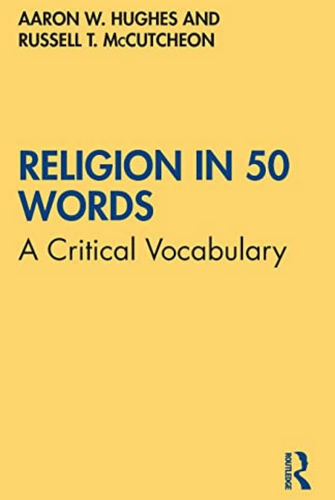 1 - Religion in 50 Words: A Critical Vocabulary, by Aaron W. Hughes and Russell T. McCutcheon: The first of a two-volume work that seeks to transform the study of religion by offering a radically critical perspective. It does so by providing a succinct and critical examination of the key words used in the modern study of religion. Arranged alphabetically, the book explores the historic roots, varied uses, and current significance and utility of the technical terms used within the current field of religious studies. These are the terms that both students and scholars routinely deploy to think about, describe, and analyse data―sometimes without realising that they are themselves technical tools in need of attention.
1 - Religion in 50 Words: A Critical Vocabulary, by Aaron W. Hughes and Russell T. McCutcheon: The first of a two-volume work that seeks to transform the study of religion by offering a radically critical perspective. It does so by providing a succinct and critical examination of the key words used in the modern study of religion. Arranged alphabetically, the book explores the historic roots, varied uses, and current significance and utility of the technical terms used within the current field of religious studies. These are the terms that both students and scholars routinely deploy to think about, describe, and analyse data―sometimes without realising that they are themselves technical tools in need of attention.
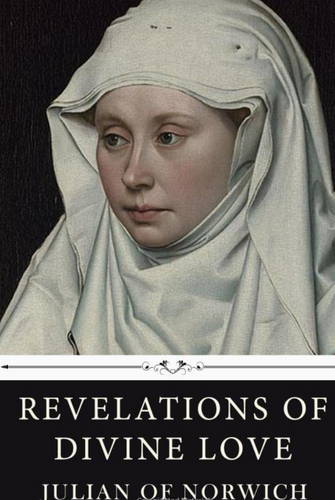 2 - Revelations of Divine Love, by Julian of Norwich: A mediaeval book of Christian mystical devotions. It was written by an anchoress called Dame Julian, now known as Julian of Norwich, about whom almost nothing is known. The book is remarkable for being the earliest surviving example of a book in the English language to have been written by a woman. Julian, who lived all her life in the English city of Norwich, wrote about the sixteen mystical visions or "shewings" she received in 1373, when she was thirty. Seriously ill, and on her deathbed, the visions appeared to her over a period of several hours in one night, with a final revelation occurring the following night. After making a full recovery she then wrote an account of each vision.
2 - Revelations of Divine Love, by Julian of Norwich: A mediaeval book of Christian mystical devotions. It was written by an anchoress called Dame Julian, now known as Julian of Norwich, about whom almost nothing is known. The book is remarkable for being the earliest surviving example of a book in the English language to have been written by a woman. Julian, who lived all her life in the English city of Norwich, wrote about the sixteen mystical visions or "shewings" she received in 1373, when she was thirty. Seriously ill, and on her deathbed, the visions appeared to her over a period of several hours in one night, with a final revelation occurring the following night. After making a full recovery she then wrote an account of each vision.
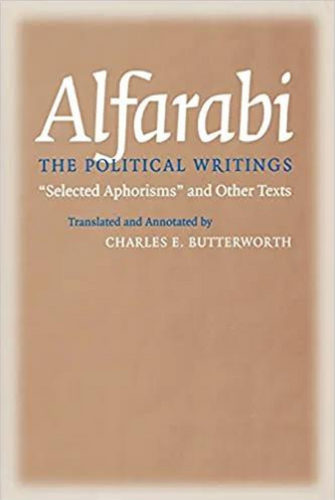 3 - Alfarabi, the Political Writings : Selected Aphorisms and Other Texts, by Farabi, translated by Charles E. Butterworth: Alfarabi was among the first to explore the tensions between the philosophy of classical Greece and that of Islam, as well as of religion generally. His writings, extraordinary in their breadth and deep learning, have had a profound impact on Islamic and Jewish philosophy. This volume presents four of Alfarabi's most important texts, making his political thought available to classicists, medievalists, and scholars of religion and Byzantine and Middle Eastern studies. In a clear prose translation by Charles E. Butterworth, these treatises provide a valuable introduction to the teachings of Alfarabi and to the development of Islamic political philosophy. All of these texts are based on new Arabic editions.
3 - Alfarabi, the Political Writings : Selected Aphorisms and Other Texts, by Farabi, translated by Charles E. Butterworth: Alfarabi was among the first to explore the tensions between the philosophy of classical Greece and that of Islam, as well as of religion generally. His writings, extraordinary in their breadth and deep learning, have had a profound impact on Islamic and Jewish philosophy. This volume presents four of Alfarabi's most important texts, making his political thought available to classicists, medievalists, and scholars of religion and Byzantine and Middle Eastern studies. In a clear prose translation by Charles E. Butterworth, these treatises provide a valuable introduction to the teachings of Alfarabi and to the development of Islamic political philosophy. All of these texts are based on new Arabic editions.
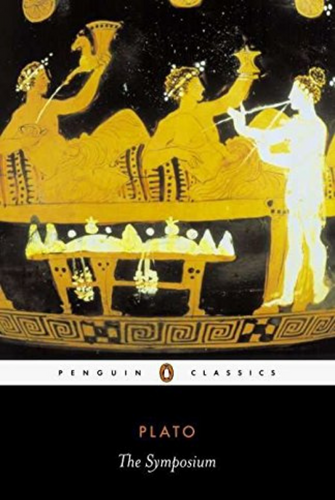 4 - Symposium, by Plato: In the course of a lively drinking party, a group of Athenian intellectuals exchange views on eros, or desire. From their conversation emerges a series of subtle reflections on gender roles, sex in society and the sublimation of basic human instincts. The discussion culminates in a radical challenge to conventional views by Plato's mentor, Socrates, who advocates transcendence through spiritual love. The Symposium is a deft interweaving of different viewpoints and ideas about the nature of love—as a response to beauty, a cosmic force, a motive for social action and as a means of ethical education.
4 - Symposium, by Plato: In the course of a lively drinking party, a group of Athenian intellectuals exchange views on eros, or desire. From their conversation emerges a series of subtle reflections on gender roles, sex in society and the sublimation of basic human instincts. The discussion culminates in a radical challenge to conventional views by Plato's mentor, Socrates, who advocates transcendence through spiritual love. The Symposium is a deft interweaving of different viewpoints and ideas about the nature of love—as a response to beauty, a cosmic force, a motive for social action and as a means of ethical education.
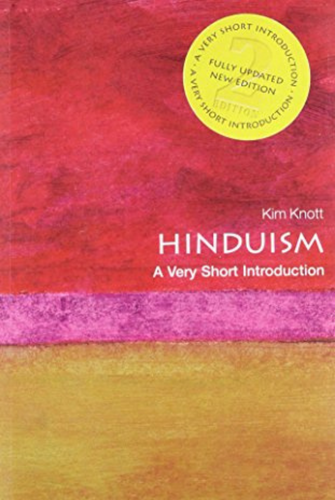 5 - Hinduism: A Very Short Introduction, by Kim Knott: Hinduism is practised by nearly eighty per cent of India's population, and by some seventy million people outside India. In this Very Short Introduction, Kim Knott offers a succinct and authoritative overview of this major religion, and analyses the challenges facing it in the twenty-first century. She discusses key preoccupations of Hinduism such as the centrality of the Veda as religious texts, the role of Brahmins, gurus, and storytellers in the transmission of divine truths, and the cultural and moral importance of epics such as the Ramayana. In this second edition Knott considers the impact of changes in technology and the flourishing of social media on Hinduism, and looks at the presence of Hinduism in popular culture, considering pieces such as Sita Sings the Blues. She also analyses recent developments in India, and the impact issues such as Hindu nationalism and the politicisation of Hinduism have on Hindus worldwide.
5 - Hinduism: A Very Short Introduction, by Kim Knott: Hinduism is practised by nearly eighty per cent of India's population, and by some seventy million people outside India. In this Very Short Introduction, Kim Knott offers a succinct and authoritative overview of this major religion, and analyses the challenges facing it in the twenty-first century. She discusses key preoccupations of Hinduism such as the centrality of the Veda as religious texts, the role of Brahmins, gurus, and storytellers in the transmission of divine truths, and the cultural and moral importance of epics such as the Ramayana. In this second edition Knott considers the impact of changes in technology and the flourishing of social media on Hinduism, and looks at the presence of Hinduism in popular culture, considering pieces such as Sita Sings the Blues. She also analyses recent developments in India, and the impact issues such as Hindu nationalism and the politicisation of Hinduism have on Hindus worldwide.
Some further readings:
- Adamson, Peter. Philosophy in the Islamic World: A Very Short Introduction. Keown, Damien. Buddhism: A Very Short Introduction.
- Solomon, Norman. Judaism: A Very Short Introduction.
- Sanders, E.P. Paul: A Very Short Introduction.
Explore your subject further
Supracurricular exploration is an important way to expand your knowledge of your subject, explore your interests and develop your skills. Our new webpage contains guidance on supracurricular exploration and a comprehensive source of resources, grouped according to undergraduate degrees at Cambridge.




